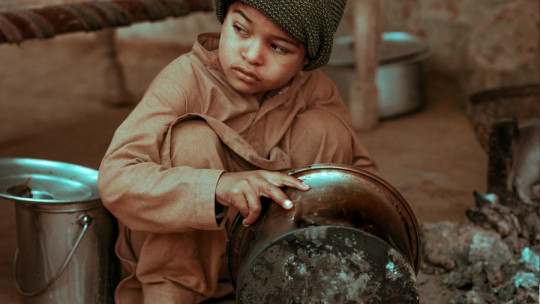
In recent decades, numerous laws and policies have been carried out that have facilitated the rights and quality of life of many people previously discriminated against, as is the case with the racial and racist problem. From dominant, white and privileged perspectives, some figures have defended that racism barely exists or exists in our societies, as if it were not still valid in practically everything around us.
From the existence of Conguitos, chocolate sweets characterized as inhabitants of African countries, to the unpleasant custom of putting makeup on white people like Baltasar in the parades of kings. Different racist attitudes and social dynamics exist in our society in such a normalized way that many people do not seem to realize it.
It is important to take our place in history and the social inequalities that have been suffered throughout it. Accepting our privileges and historical differences in relation to racialized and discriminated people is a first step to accept that racism is still present in our cultures. As long as there are people suffering its consequences, all the rest of us will be responsible for deconstructing ourselves and seeking to create safe spaces.
Racism in Western society
Racism in Europe has deep historical roots dating back to the colonial era and the imperialist expansion of the 18th and 19th centuries. During this period, European powers conquered vast regions of the world, subjecting entire populations to their domination and justifying these actions through racist ideologies that affirmed the superiority of the white race over others.
These colonial ideologies laid the foundation for the perpetuation of racism in European society, even after the end of the colonial era. Popularly, the idea is promoted that the racial struggle gained important ground with the abolition of slavery in much of Europe in the 19th century. However, racist attitudes did not disappear overnight and continue to be part, in different forms, of the Western and white social and collective imagination. So, These beliefs became deeply rooted in the social and cultural structures of European countries influencing the way racialized people are perceived and treated in society.
Throughout the 20th century, Europe witnessed mass migration of people from its former colonies, as well as from other regions of the world. These migrations, largely motivated by the desire to escape poverty and war, brought ethnic and cultural diversity to European societies, challenging established notions of racial homogeneity.
However, despite growing ethnic diversity, racism persists in Europe in various forms. From verbal and physical attacks motivated by racial hatred to systemic discrimination in access to housing, employment and education, racialized people continue to face significant obstacles to their full integration into society.
Normalization of racism in Spain
Spain, like many other European countries, has historically been influenced by colonialism and slavery, which has left an indelible mark on the way people of different ethnic backgrounds are perceived and treated. Despite progress in terms of equality and civil rights, racism continues to be a palpable reality in Spanish society.
One of the most obvious manifestations of the normalization of racism in Spain is found in political and media discourse. Xenophobic and anti-immigrant rhetoric has gained ground on the political landscape, with parties and leaders using fear and intolerance towards immigrants as a tool to gain popular support. This narrative feeds harmful stereotypes and promotes the idea of supposed cultural superiority that justifies discrimination towards those who are perceived as “different.”
Furthermore, racism in Spain manifests itself more subtly in institutions and social structures. Discrimination in access to employment, housing and education is a reality for many racialized people, who face additional barriers due to their ethnic origin. Studies show that people with non-Spanish names or surnames are less likely to be selected for job interviews, which shows the persistence of discriminatory prejudices in the labor market.
Popular culture also plays an important role in the normalization of racism in Spain. Racial and cultural stereotypes are present in the media, film and television, perpetuating simplistic and distorted notions about people of non-European origin. These representations contribute to the objectification and marginalization of racialized communities, reinforcing the idea that they do not fully belong to Spanish society.
It is essential to recognize that racism in Spain is not an isolated phenomenon, but part of a broader system of oppression and inequality. To combat it effectively, it is necessary to address not only its most obvious manifestations, but also the underlying attitudes and structures that support it. This requires a collective commitment to challenge bias, promote diversity and inclusion, and work toward building a more just and equitable society for all people, regardless of racial or ethnic background.
Consequences of normalized racism
The consequences of normalized racism are profound and damaging both for the people directly affected and for society as a whole. Primarily, racism undermines fundamental human rights and perpetuates inequality, denying racialized people equal opportunities and access to basic resources such as housing, employment and education.
1. Mental and emotional health
Racial discrimination also has a significant impact on the mental and emotional health of those affected. Being the target of discrimination and prejudice can lead to feelings of inferiority, anxiety, depression and chronic stress, which negatively affects the quality of life and psychological well-being of racialized people.
2. Social fragmentation
Furthermore, normalized racism contributes to social fragmentation and lack of cohesion within society. By perpetuating the division between “us” and “them” based on race or ethnicity, The bonds of solidarity and empathy that are fundamental to building strong and resilient communities are eroded.
3. Economic and political implications
On a broader level, normalized racism also has economic and political implications. Discrimination in the workplace and lack of equitable access to educational and economic opportunities perpetuate income inequality and economic marginalization of racialized communities, which in turn fuels the wealth gap and social injustice.
4. Interpersonal and social conflicts
Besides, Normalized racism can generate intergroup tensions and social conflicts, undermining social cohesion and political stability. Incidents of racial violence, rising intolerance, and political polarization are some of the most obvious manifestations of the destructive impacts of racism on society.
The importance of changing the narrative
Recognizing and addressing the normalization of racism is essential to building a more just, inclusive and equitable society. Changing the narrative around racism involves challenging preconceptions, promoting awareness of racial injustices, and fostering empathy and solidarity among all people, regardless of ethnicity. It is crucial to understand that racism is not an individual problem, but a structural phenomenon rooted in social institutions and practices. Addressing racism therefore involves not only changing individual attitudes, but also dismantling the structures and systems that perpetuate racial discrimination.
One of the most effective ways to change the narrative about racism is through education and awareness. It is important to teach people about the history of racism, its impacts on society, and the ways it manifests itself in everyday life. This helps challenge entrenched stereotypes and prejudices and fosters greater understanding and respect for racial and ethnic diversity. Additionally, it is essential to amplify the voices of people affected by racism and provide space for them to share their experiences and perspectives. This helps humanize the impact of racism and build empathy and solidarity between communities.
Public policy also plays a crucial role in changing the narrative on racism. It is important to implement measures that promote equal opportunities and combat racial discrimination in all its forms. This includes inclusion policies in the workplace, education and society, as well as strengthening laws against racial discrimination and hate.
As a last resort, Changing the narrative on racism requires a collective commitment to challenge the structures and attitudes that support it. It is an ongoing process that requires the active participation of individuals, communities, institutions and governments to create a future where equality and racial justice are a reality for all.
Conclusions
In conclusion, the persistence of normalized racism in Western contexts, such as Spain, underlines the urgency of a profound change in narrative and social policies. Recognizing and addressing this reality is essential to building more inclusive and just societies. Only through collective commitment and determined action can we overcome the barriers of racism and move toward a future of equality and mutual respect.








